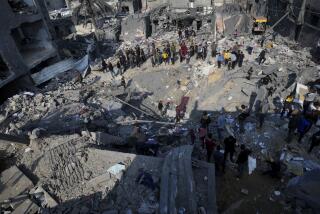Serbs’ Reaction Is Unknown Factor in Bosnia Equation : Balkans: Experts agree that Belgrade and rebels are likely to remain defiant unless allies take forceful action.
- Share via
WASHINGTON — As President Clinton nears a decision today on what measures to take to force the Serbs to halt their campaign of “ethnic cleansing” in Bosnia-Herzegovina, one major question looms: How will the Serbs react to what Washington and its allies decide?
The issue is critical. Experts point out that the Serbs have come to view themselves as martyrs and are determined to face down enemies. And they say that the Belgrade government, as their sponsor, has reasons for continuing the fight, even though authorities there have been urging rebel Serbs in Bosnia to accept the international peace plan for the region.
“(The Serbs’) culture and their propaganda have been those of defiance, resistance, a sense of grievance,” said Janusz Bugajski, an expert on Eastern Europe at the Center for Strategic and International Studies. “The phrase ‘victory at all costs’ has some resonance for them.”
Bugajski and other experts on Serbian culture warned that the allies are not likely to achieve their goal unless they launch powerful strikes and the Serbs are made to believe that more are on the way if they do not change course.
The experts also said that the allies must credibly threaten the Belgrade government, either by bombing Yugoslav supply lines or by serving notice clearly that Yugoslav military targets are next on the list. They said allied efforts would backfire if there was any hint of hesitation.
Patrick Glynn, a resident scholar at the American Enterprise Institute, said that so far the Serbs have displayed what he called “classic Communist tactics”--they remain defiant until the West is on the brink of action, then they suddenly pull back for a brief respite.
But, he cautioned, “there’s a different calculus when you move into the realm of military action, because emotions start to become involved in a different way. A lot depends on how we structure the action.”
If there’s one point on which scholars of Serbia seem to agree, it’s that incremental measures--such as limited bombings designed to “send a message” to rebel Bosnian Serbs and their backers in the Belgrade regime--are likely only to make the Serbs more defiant.
“The worst thing you can do is to limit the action to a surgical strike--especially if you don’t follow up with larger-scale bombings,” Glynn said. The Serbs would quickly realize that was all the allies planned to do, he declared, and simply grit their teeth and ride it out.
George Kenney, an expert on Eastern Europe at the Carnegie Endowment for International Peace, has little use for another much-talked-about option--lifting for the Bosnian Muslims the U.N. ban on arms sales to all of the republics in what used to be Yugoslavia.
If the embargo was rescinded, Kenney said, “it would only prompt the Serbs to grab as much additional territory as they could before the Muslims obtained more arms and learned how to use them. They also might muster more troops. It could lead to slaughter.”
Kenney believes that heavy bombing, possibly continued for several weeks, could provide “a psychological shock” that might drive the Serbs to the bargaining table.
But he gave such a scenario only “a 50-50 chance” of success.
The only certain way to quell Serbian attacks would be to send allied ground troops into the area, Kenney said. “I’m dismayed that President Clinton (ruled) them out,” he said. “It could have prevented (the Serbs) from out-anteing us again.”
To many experts on Eastern Europe, the key to getting at the Serbian rebels is to persuade their sponsors in Belgrade that further aggression would be counterproductive. That, in turn, would cut off the rebels’ main source of supply and the fighting would stop.
“You want to make them worried in Belgrade that the Yugoslav air force is about to disappear,” Glynn said.
But analysts agreed that would not be easy. They said that Serbian President Slobodan Milosevic sees “ethnic cleansing” in Bosnia as a way to unite Serbian factions and prevent the fracture of his own power in the rump Yugoslav federation that now consists only of Serbia and Montenegro.
Most analysts familiar with the region question whether Serbian forces would be able to put up much of a fight against allied ground troops. Kenney described them as “more criminal gangs than military units” and said they would “very likely flee early in the fighting.”
But he warned that even if they won on the ground, the allies still would probably have to keep troops in the region for a long time to make sure that subsequent uprisings did not occur.
Bugajski, Kenney and Glynn all cautioned that, whatever the allies do, they must avoid the mistakes made in Vietnam--limiting air strikes to symbolic gestures, introducing “pauses” during which enemy forces can regroup and exempting key targets for political reasons.
The Serbs have used defy-and-desist tactics much as Iraqi President Saddam Hussein has done in the period since the Persian Gulf War, Bugajski said. “But I think they’re a little more realistic than Hussein.”
More to Read
Sign up for Essential California
The most important California stories and recommendations in your inbox every morning.
You may occasionally receive promotional content from the Los Angeles Times.













